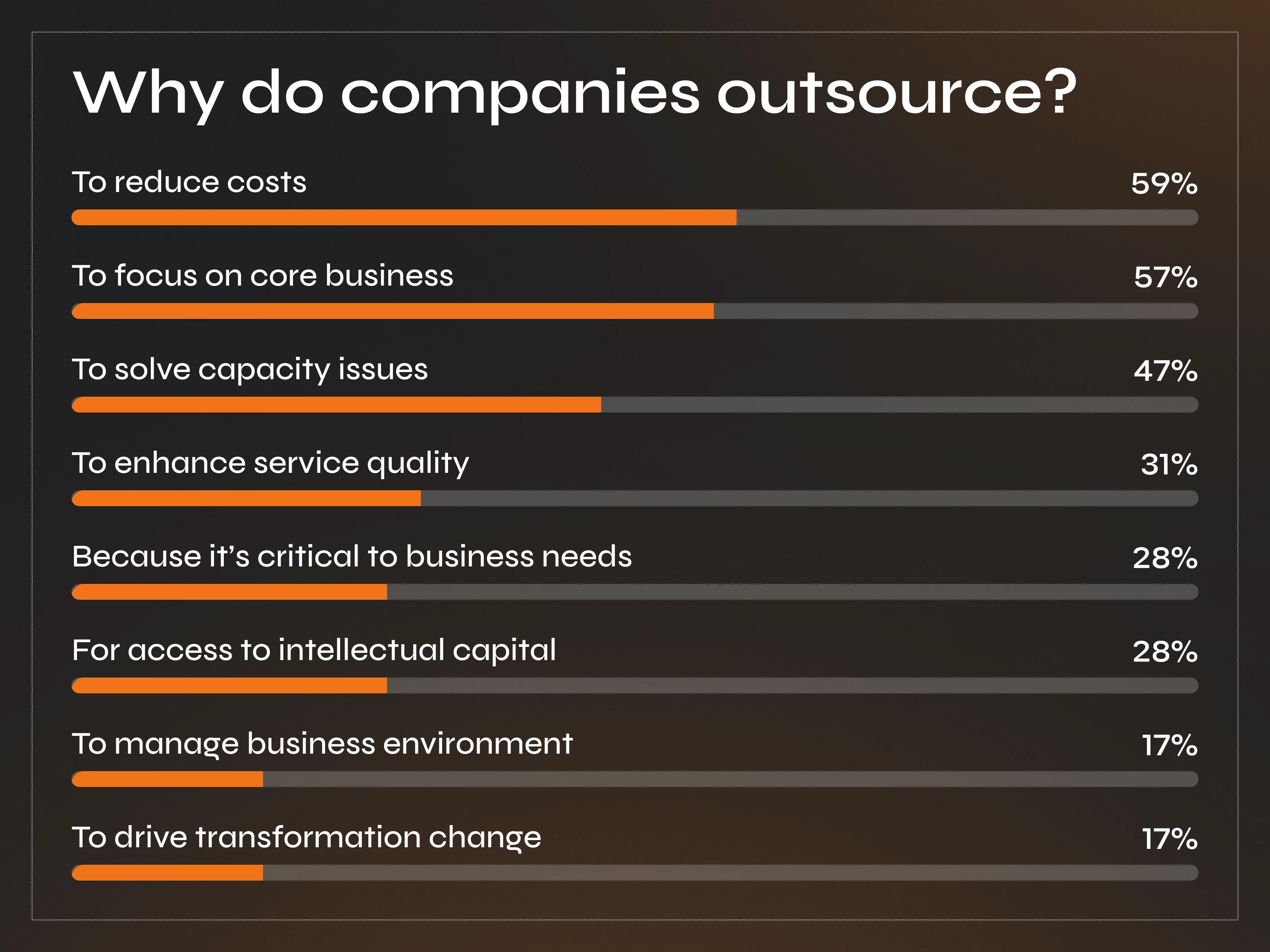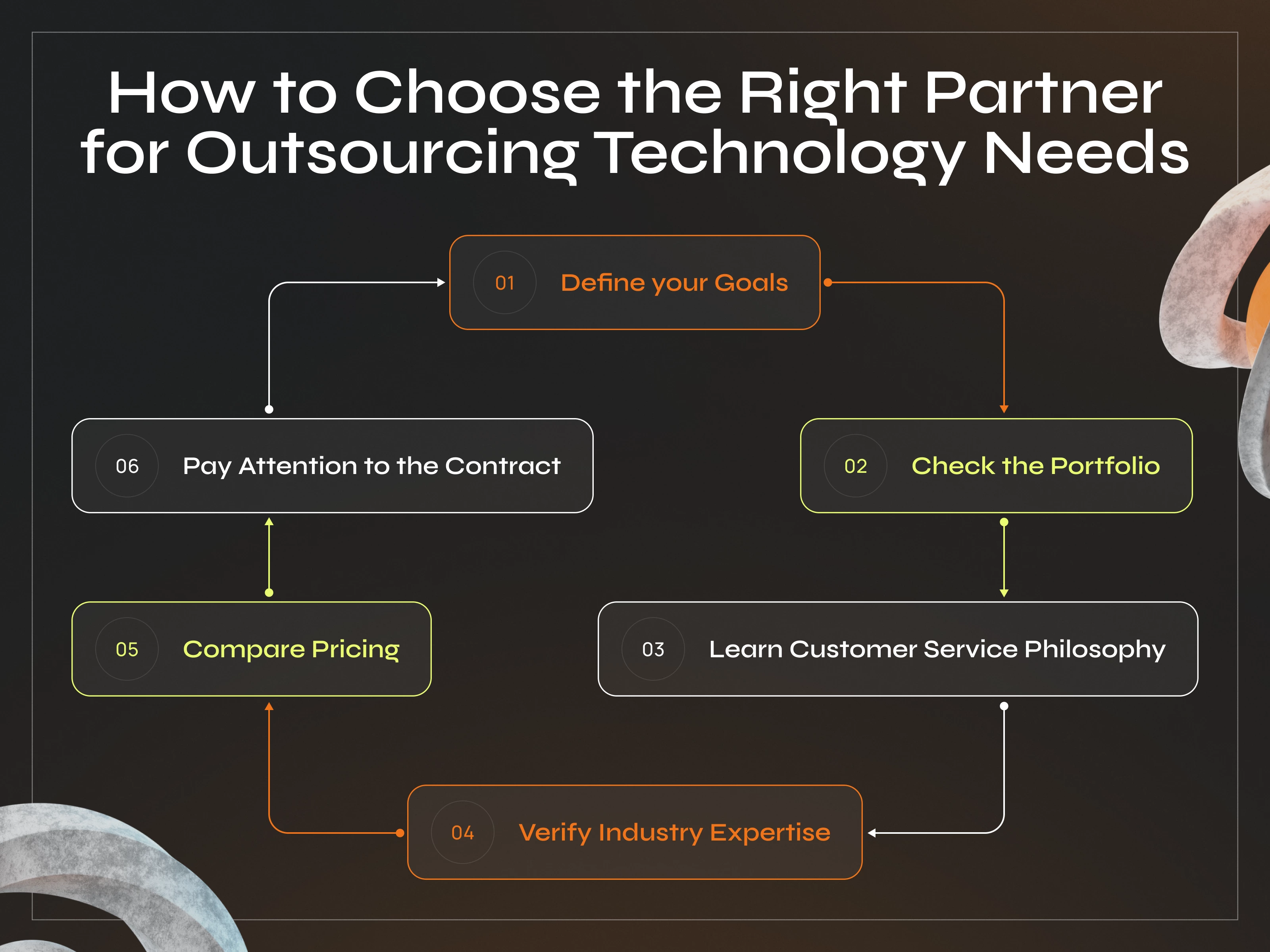Outsourcing has become a strategic necessity for startups looking to scale efficiently while saving costs. Whether it’s software development, design, branding, or other business functions, partnering with the right outsourcing provider can immensely impact a startup’s success.
Outsourcing has become a strategic necessity for startups looking to scale efficiently while saving costs. Whether it’s software development, design, branding, or other business functions, partnering with the right outsourcing provider can immensely impact a startup’s success. Conversely, choosing an unreliable partner can play a cruel joke on you. From spending way too much money to receiving a poor and unreliable final product, the wrong choice can lead to significant regrets afterward.
That being said, selecting the proper outsourcing partner requires careful consideration and a well-defined checklist to guarantee seamless collaboration. This article will explore the key factors startups should consider when choosing an outsourcing partner.
Why do Companies Outsource?
Outsourcing involves delegating business processes to an external company or third-party provider, which assumes responsibility for executing and managing various operations, tasks, and services. This external entity oversees its employees and systems to deliver the required services, with common outsourcing areas encompassing information technology (IT) services, marketing, and technical support.

Several reasons drive companies to opt for outsourcing, with the primary motivations being:
Reduction in Costs
Let’s be real. Why do businesses choose to outsource their key operations? Why do outsourcing partners grow like mushrooms after rain? The answer is simple — companies want to cut costs without compromising quality, as supported by a Deloitte study revealing that 70% of businesses cite cost reduction as a primary motivation to outsource. Outsourcing tasks to contractors provide equivalent results to hiring full-time employees but at a lower cost, ultimately enhancing the business’s profitability.
Increases Efficiency & Focus
Small business owners often find themselves diverted from their core responsibilities when handling secondary and tertiary tasks. Outsourcing these functions to contractors allows business owners to maintain focus on their primary operations, leading to increased efficiency and facilitating business growth.
Frees Up Resources
Limited resources are a common challenge for small businesses. Outsourcing enables these businesses to allocate their resources strategically, concentrating on essential tasks for business operations and customer service improvement. Any task that detracts from these core functions can be outsourced to ensure optimal resource utilization.
Increases Flexibility
Business environments evolve rapidly, necessitating agility to meet market demands promptly. Outsourcing provides the flexibility to engage competent contractors to address changing conditions quickly. This agility contrasts with the time-consuming process of hiring and training new employees, allowing businesses to adapt swiftly to dynamic market demands.
Access to a Diverse Talent Pool
Outsourcing opens the door to a diverse global talent pool, providing access to various capabilities. Unlike hiring a local employee, outsourcing allows businesses to engage with professionals worldwide, ensuring they have the expertise and skills to adapt to evolving business requirements.
Read also: Phenomenon Studio won a 2023 Manifest Award
How to Choose the Right Outsourcing Partner?
While it might seem tempting to stop there, we are not taking the easy route. Relying solely on low prices carries a risk of engaging with unreliable service providers. This raises the question: how can startups strike a delicate balance between reasonable prices and delivering high-quality services? Let’s figure it out.

To help startups navigate this risky but exciting path, we’ve compiled a checklist of vital steps they should take to locate a lucrative partnership. These include:
1. Define your Goals
Initiating the process of selecting an outsourcing partner begins with a precise definition of your requirements. Identify the specific functions you need help with and frame your outsourcing goals. After that, you can streamline your search and identify a partner that aligns well with your company’s needs. For instance, if you’re a software company, you might want to outsource software testing, customer support, or even parts of the development process. This precision in outlining your needs is fundamental to finding a suitable partner.
Once your criteria are clear, the next step involves thorough research. Explore various avenues to identify potential outsourcing partners, leveraging resources such as online directories and word-of-mouth recommendations or using a regular Google search, which is how you found this article. These research methods will contribute to a comprehensive understanding of potential partners and assist you in making a practical decision.
2. Check the Portfolio
Review the potential outsourcing partner’s portfolio to assess their expertise and experience. Examine past projects, client testimonials, and case studies to gauge the partner’s ability to deliver quality results in line with your expectations. If you are outsourcing the design component of your project, focus on UI/UX projects that closely align with your specific requirements. Paying particular attention to similar projects can enhance the likelihood of finding a suitable partner for your design needs. Useful portfolio sites are Behance and Dribbble, where you can see the company’s cases and other people’s reviews and reactions to those designs. You can also ask for references in the company of similar projects to yours to understand if you are on the same page.
Related: Web Application vs Website: Navigating the Digital Landscape
3. Learn Customer Service Philosophy
Analyzing the historical background of an outsourcing company is a crucial stage in assessing its viability as a potential partner. Gaining insights into their evolution from the past to the present and their future aspirations offers valuable information about their growth trajectory, adaptability, and alignment with your business requirements. Look at the reviews of other companies’ customers (this can be done on directories, for example, on Clutch, DesignRush, AgencySpotter, Webflow, etc). Check the brands’ philosophies (companies often state their values and mission on their website). Upon a deep analysis, you will understand whether this is a good partner for you. Always assess compatibility, collaboration potential, and the ability to achieve positive outcomes together.
4. Verify Industry Expertise
When selecting an outsourcing vendor, the company’s background holds significant importance. Verify that your chosen partner possesses industry-specific experience. This ensures a seamless development process and guarantees a high-quality solution tailored to fit perfectly within your project.
Furthermore, experts with relevant experience can offer valuable insights, advising to refine project requirements for optimal alignment with user needs. Verifying this information is straightforward—during your research, explore the prospective vendors’ websites to identify the industries they are actively engaged in.
We can’t stress enough how important it is to review case studies, as these resources can effectively highlight the provider that best aligns with your project.
5. Compare Pricing
You likely have a specific budget set aside for your project requirements. If you’re new to outsourcing, it’s advisable to research various pricing models before delving into the search for IT services. Outsourcing allows you to find a partner who aligns with a suitable pricing model to meet your budgetary constraints.
However, the decision on a pricing model is more nuanced than it may initially appear. For instance, opting for a fixed-price model (where you pay a predetermined amount for project completion) might seem straightforward. Still, it requires well-defined requirements because misunderstandings could increase the costs of reworking the solution.
When choosing a partner, you should obviously compare prices among competitors, but it is important to note that choosing the cheapest option can often have negative consequences. It is also worth considering whether the company does a discovery stage because this contributes to a higher quality estimate and work as a whole. When budgeting for outsourcing, it’s crucial to include the immediate costs and the long-term value that outsourcing can contribute to your organization. Investing in the right outsourcing partner grants you access to top-tier talent, cutting-edge technologies, and industry best practices, which can propel your business forward.
6. Pay Attention to the Contract
Before embarking on your outsourcing voyage, it’s crucial to meticulously document every detail, no matter how minor, to eliminate ambiguity and prevent unexpected issues. The foundation of a successful and robust outsourcing partnership relies on a contract that both sides unequivocally understand. Ask for external legal guidance to make sure you understand every little detail.
Consider including these essential categories of clauses in your outsourcing contract:
Project Details and Management:
- Define the project’s scope, outline service-level agreements, and specify governance and performance monitoring procedures.
Financials:
- Encompass clauses covering the transfer of assets and the payment structure to address all monetary aspects comprehensively.
Legal Rights and Obligations:
- Specify warranties, liabilities, product ownership, intellectual property rights, indemnification, and any provisions related to subcontracting.
Dispute and Termination:
- Manage potential disagreements and contract termination by incorporating dispute resolution and exit strategy clauses.
Business Continuity:
- Assure continued service by including clauses that address business continuity and document hierarchy in the face of unexpected events.
Contractual Duration:
- Clearly define the length of the contract to establish a timeframe for the outsourcing arrangement.
Bottom line
Although, generally, there can’t be a one-size-fits-all approach to choosing your perfect partner, this checklist will surely set you up for success. We at Phenomenon have worked in this market for four years and remain a reliable partner for all clients. Do you want to find a reliable partner to take over a project that is dear to your heart? Contact us today, and let’s discuss the beginning of a lucrative and exciting journey!













